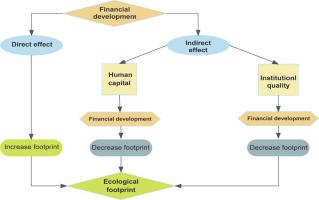Gondwana Research ( IF 7.2 ) Pub Date : 2021-09-22 , DOI: 10.1016/j.gr.2021.09.012 Mahmood Ahmad 1 , Zahoor Ahmed 2, 3 , Xiyue Yang 4 , Nazim Hussain 5 , Avik Sinha 6

|
Emerging countries are heading towards economic prosperity; however, the process of development has enhanced their ecological footprint. Therefore, to safeguard the environment, it is essential to identify the factors that affect the ecological footprint (EF). In this perspective, this study explores the effect of financial development, human capital, and institutional quality on the EF in emerging countries. Furthermore, we explore the effect of financial development on EF through the channel of human capital. In addition, we investigate the role of institutional quality in the financial development-EF nexus. Using the panel data from 1984 to 2017, we employed the cross-sectional autoregressive distributed lag (CS-ARDL) technique to conduct the short-run and long-run empirical analysis. The empirical outcomes unveiled that financial development degrades the ecological quality by raising the EF. The findings further unfolded that human capital and institutional quality reduce the EF. Moreover, financial development fosters environmental sustainability through the channel of human capital. Additionally, institution quality reduces the negative ecological impacts of financial development. The causality analysis suggested that any policy related to financial development, human capital, and institutional quality will affect EF but not the other way round. Based on these findings, emerging economies should promote environmental sustainability by promoting human capital and effectively using financial resources.
中文翻译:

金融发展和环境退化:人力资本和制度质量会产生影响吗?
新兴国家正走向经济繁荣;然而,发展过程增加了它们的生态足迹。因此,为了保护环境,必须确定影响生态足迹(EF)的因素。从这个角度来看,本研究探讨了金融发展、人力资本和制度质量对新兴国家 EF 的影响。此外,我们通过人力资本渠道探索金融发展对EF的影响。此外,我们调查了制度质量在金融发展-EF 关系中的作用。使用1984年至2017年的面板数据,我们采用横截面自回归分布滞后(CS-ARDL)技术进行短期和长期实证分析。实证结果表明,金融发展通过提高 EF 降低了生态质量。研究结果进一步表明,人力资本和制度质量会降低 EF。此外,金融发展通过人力资本渠道促进环境可持续性。此外,制度质量降低了金融发展对生态的负面影响。因果关系分析表明,任何与金融发展、人力资本和制度质量相关的政策都会影响 EF,但反过来不会。基于这些发现,新兴经济体应通过促进人力资本和有效利用金融资源来促进环境可持续性。研究结果进一步表明,人力资本和制度质量会降低 EF。此外,金融发展通过人力资本渠道促进环境可持续性。此外,制度质量降低了金融发展对生态的负面影响。因果关系分析表明,任何与金融发展、人力资本和制度质量相关的政策都会影响 EF,但反过来不会。基于这些发现,新兴经济体应通过促进人力资本和有效利用金融资源来促进环境可持续性。研究结果进一步表明,人力资本和制度质量会降低 EF。此外,金融发展通过人力资本渠道促进环境可持续性。此外,制度质量降低了金融发展对生态的负面影响。因果关系分析表明,任何与金融发展、人力资本和制度质量相关的政策都会影响 EF,但反过来不会。基于这些发现,新兴经济体应通过促进人力资本和有效利用金融资源来促进环境可持续性。因果关系分析表明,任何与金融发展、人力资本和制度质量相关的政策都会影响 EF,但反过来不会。基于这些发现,新兴经济体应通过促进人力资本和有效利用金融资源来促进环境可持续性。因果关系分析表明,任何与金融发展、人力资本和制度质量相关的政策都会影响 EF,但反过来不会。基于这些发现,新兴经济体应通过促进人力资本和有效利用金融资源来促进环境可持续性。







































 京公网安备 11010802027423号
京公网安备 11010802027423号